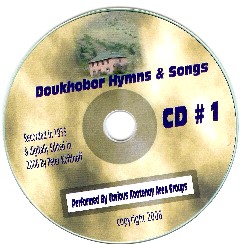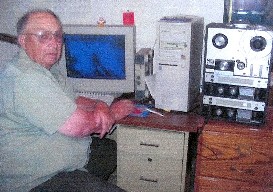Doukhobor Hymns and Psalms Digitalized from the 1950s
Peter Kofnikoff saves historical recordings of Doukhobor youth
By Koozma J. Tarasoff, March 26,
2007
 Two CDs of
traditional Doukhobor singing from the 1950s have been
released by Peter Koftinoff, a retired Doukhobor of Grand Forks,
British Columbia. A bonus short disc comes from a 1953 Youth Festival.
They are down to earth songs by ordinary people and not by professional
singers. The enthusiasm and the dedication of these singers are very
evident.
Two CDs of
traditional Doukhobor singing from the 1950s have been
released by Peter Koftinoff, a retired Doukhobor of Grand Forks,
British Columbia. A bonus short disc comes from a 1953 Youth Festival.
They are down to earth songs by ordinary people and not by professional
singers. The enthusiasm and the dedication of these singers are very
evident.All three are available from Peter Koftinoff, 3185 Koftinoff Road, Grand Forks, BC VOH 1H2. Phone: (250) 442-8580 — website: pwk.statusbar.com
Older people who hear the choral selections are amazed at how the singing has changed with the new generation. Several hymns and songs are by the Paul Samsonoff Choir, as identified by Paul’s lead voice. Other groups are from Ooteshenie, Glade, Pass Creek, and Castlegar and other areas of the West Kootenays.
 Peter
Koftinoff of Grand Forks, BC was commissioned by the CBC Radio in
1954 to produce several programs on the activities of the Union of
Youth of the Union of Spiritual Communities of Christ (Doukhobors).
During the course of 1954-1955 Peter traveled with several other
participants, mainly Jim Kolesnikoff and Peter Samoyloff, and recorded
many hours of singing.
Peter
Koftinoff of Grand Forks, BC was commissioned by the CBC Radio in
1954 to produce several programs on the activities of the Union of
Youth of the Union of Spiritual Communities of Christ (Doukhobors).
During the course of 1954-1955 Peter traveled with several other
participants, mainly Jim Kolesnikoff and Peter Samoyloff, and recorded
many hours of singing.Unfortunately the project was cancelled within a year and the tapes were stored away. Fifty years later Peter found the taped material. The information was deteriorating on the tapes, therefore had to be digitally restored and edited. The singing consists of several choirs and area groups who would gather together and rehearse. The selections are from the Kootenay area of Nelson, Castlegar and surrounding communities. Peter recorded these CDs as two one-hour each. The announcer was Harry Barisoff (now Harry Reibin).
Here is an email letter that I sent to Peter March 25th:
Hello Peter:
Your package of CDs arrived earlier in the week, but it was only today that I had a chance to play them from end to end. They were a delight. Much appreciated!
In fact, this evening I decided to make a large pot of Doukhobor borshch, using the recipe that my mother taught me years ago. With your background music of Doukhobor hymns and songs, it was a nostalgic evening of listening, remembering, and singing along as well as enjoying good food. You have made my day!
The 1955 period was also the time when I was active in a Doukhobor Youth Choir in Saskatoon as well as being editor of The Inquirer. Many of the selections you recorded were quite familiar to me because I used to sing them. Although the names were not published, it seems like I recognized several voices from the Kootenay group: Paul Samsonoff, Peter Kolesnikoff, Peter Samoyloff, Peter M. Gritchen and Bill Kootnekoff — all wonderful singers.
You have done an excellent job in digitizing the selections. As well, I enjoyed hearing the professional sounds of a male voice on CD#1 introducing the numbers.
Your field work recalls the early 1960s when musicologist Kenneth Peacock made his research trip to the Doukhobor communities and recorded select numbers for the Museum of Man. These sections are now available at the Canadian Museum of Civilization in the Ottawa-Gatineau area of Ontario and also at the provincial Public Archives, Saskatoon, Saskatchewan. Both your work and that of Peacock’s have helped to preserve Doukhobor heritage for posterity.
Thank you for gifting me these CDs. I am delighted to have them in my collection. Bolshoe spasibo! I am indeed grateful to you.
Best wishes, Koozma J. Tarasoff
Your package of CDs arrived earlier in the week, but it was only today that I had a chance to play them from end to end. They were a delight. Much appreciated!
In fact, this evening I decided to make a large pot of Doukhobor borshch, using the recipe that my mother taught me years ago. With your background music of Doukhobor hymns and songs, it was a nostalgic evening of listening, remembering, and singing along as well as enjoying good food. You have made my day!
The 1955 period was also the time when I was active in a Doukhobor Youth Choir in Saskatoon as well as being editor of The Inquirer. Many of the selections you recorded were quite familiar to me because I used to sing them. Although the names were not published, it seems like I recognized several voices from the Kootenay group: Paul Samsonoff, Peter Kolesnikoff, Peter Samoyloff, Peter M. Gritchen and Bill Kootnekoff — all wonderful singers.
You have done an excellent job in digitizing the selections. As well, I enjoyed hearing the professional sounds of a male voice on CD#1 introducing the numbers.
Your field work recalls the early 1960s when musicologist Kenneth Peacock made his research trip to the Doukhobor communities and recorded select numbers for the Museum of Man. These sections are now available at the Canadian Museum of Civilization in the Ottawa-Gatineau area of Ontario and also at the provincial Public Archives, Saskatoon, Saskatchewan. Both your work and that of Peacock’s have helped to preserve Doukhobor heritage for posterity.
Thank you for gifting me these CDs. I am delighted to have them in my collection. Bolshoe spasibo! I am indeed grateful to you.
Best wishes, Koozma J. Tarasoff
Questions by Andy Conovaloff,. webmaster:
Peter, you wrote: "Unfortunately before the programs were finished, they were cancelled by the UNION of YOUTH for lack of participation"
So it was the UoY (USCC) that actually canceled the project?
No, not necessarily the UOY but
the individuals participating in the project. For instance, the group
that were to write the scripts, had only one script written and plans
for 9 more. Then one by one the group diminished and faded out. (figure
of speech) I finally had to leave for Alberta and after delivering all
the loaned recording equipment to the CBC, I packed up and left B.C.
for several years. The recordings stayed with me untill now. They were
my
property as I never signed them off.
Did the youth not have any desire to showcase themselves due to the English picking on them in public?
Yes, and that was the whole idea
behind the programs. We had planned 10 programs about the Doukhobor
life. Each program was to depict a part of the heritage and way of
life. For example, one program would explain about the conduct of
funerals, another about weddings, and others would be about other
activities and so on. The narration and the songs would be appropriate
to the subject. When these programs were being recorded, the activities
of the SOF were quite prevalent so the U.O.Y. and the CBC had
intentions of educating the general public about the differences of
the groups.
Can you say if the elders, or board of directors, or JJ Verigin had any say in it?
Oh definitely, they were all in
favour of the project, but could not control its demise.
It seems to me that the USCC would grab any opportunity to show the good Doukhobors, especially in the 1950s when the SOF were so active.
That is exactly the point we
tried to make.
Then why did all the other albums get privately produced after your project?
There were many albums produced
by groups and the reason was that the USCC organisation was unable to
fund everyone. The choirs and other groups raised money by doing
concerts and benefits for that purpose. And I suppose it was time for
the technology to make it more simple or easier or less costly as time
went by.
The answers and discussion of the politics and sociology of your project could make an interesting article for Koozma's website.
It sure would. Thanks Andrei